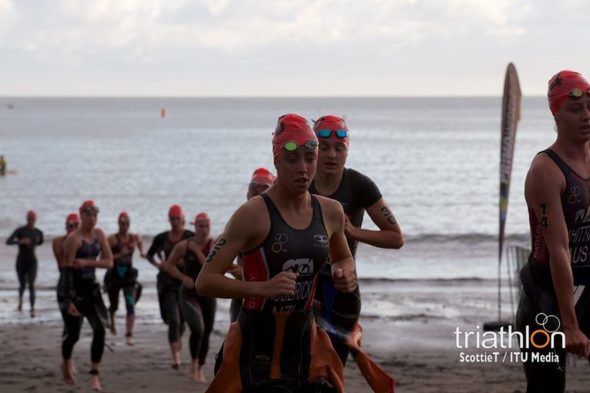 Brea Roderick (Mount Hutt College) at the WIL Sport Oceania Junior Championships & YOG New Plymouth Photo by ScottieT/ITU Media Brea Roderick (Mount Hutt College) at the WIL Sport Oceania Junior Championships & YOG New Plymouth Photo by ScottieT/ITU Media From the South Island winter to the world stage. Mount Hutt College year 11 triathlete Brea Roderick has plenty to look forward to as she prepares for two major international races in September and October. “I am racing in the Junior Elite World Championships on the Gold Coast in mid-September and then I am going to the Youth Olympics in Argentina in October, so there is not much of a gap in between,” she explains. 16 year-old Brea will be joined by two other females at the Junior World Championships, Hannah Knighton (Waikato Dio, 2017) and Ari Graham (St Andrew’s College, 2016) as well as three males in the six-strong New Zealand team. One of the males going to the World Championships is Dylan McCullough who is also joining her at the Youth Olympics. McCullough is year 13 age but left school at Saint Kentigern College at the end of last year. Another is Saxon Morgan who is from Christchurch (St Andrew’s College) and whom Brea knows well and is currently training and racing in Europe. “Right now I am training every morning and every afternoon,” Brea says. “It’s pretty cold here at the moment, but we have indoor trainers and treadmills to use if it’s raining or snowing so it works out okay in the end!” For swimming she trains in a local indoor 25-metre pool. She goes to school in Methven, which is well known as the gateway to the Mount Hutt ski field and in peak season right now. “I used to ski, but there is too much risk of injury,” she says. Down at sea level, Brea has been buoyed by her success from earlier this year. “Earlier this year I went to Adelaide, in the Australian Junior series and I did quite well at that. She was part of the New Zealand team which placed first at the Australian U19 Mixed Team Relay championship. “Then the main race that was the qualifier for the Youth Olympics was in New Plymouth, and that was also the qualifier for the World Champs.” She finished second, but was the first junior female New Zealander home. She had no expectations in qualifying for these two international events. “That was a big shock to me, I had no clue that was going to happen. “I had no idea how I was going to go because I had never really raced in that age group before, against that many girls.” Prior to that race at the end of March, she won the South Island Secondary School Triathlon Championships and finished second at the New Zealand Secondary School Nationals in the U16 division. How did Brea start triathlon? “I started about three years ago, and started it taking it seriously about a year later after winning some races. I started training and focusing on that as my main sport and I took it from there.” She also swims, runs and bikes in individual events, but these are always with a view towards training and building up her race fitness for triathlons. For example, she finished second in the U18 race at the South Island Cross Country Championships at the start of this month. Brea is fortunate to know New Zealand’s elite number one triathlete Andrea Hewitt, also from Canterbury. “It has been really awesome to get to train with her in the past. We have been very lucky to learn off her and train with her when she has been in Christchurch.” Brea isn’t too sure exactly what the plan is with meeting up with the rest of the New Zealand Youth Olympic team ahead of flying out for Argentina. The Youth Olympics runs from 6-18 October. At the Youth Olympic Games Brea and Dylan will both compete in the individual event. They will also join Australian triathletes to form an Oceania team for the mixed team relay event. New Zealand has a strong history in triathlon at the Youth Olympics with Aaron Barclay winning at Singapore 2010, and Daniel Hoy placing second four years later at Nanjing 2014. New Zealand athletes also combined with the Australian pair in the Mixed Relay Team Event to win silver in 2010 and bronze in 2014. 17-year-old Raukawa Jefferies from Hamilton Boys High School has been selected to contest the men’s +68kg kumite category at the Buenos Aires 2018 Youth Olympic Games.
Jefferies gained selection after placing 1st in his age group at the Oceania Karate Championships. “I’m pretty amped and really excited to represent New Zealand at the Youth Olympic Games. The competitiveness is what I love about karate, I like a challenge and the sport really pushes me,” said Jefferies. Jefferies says he’s put in a lot of hard work and is proud to be the first New Zealander to compete in karate at an edition of the Olympic Games. “I’ve been training for this for two years. I went to Croatia and Bulgaria for tournaments which was pretty awesome and I’ve been training six mornings a week, Monday to Saturday, then I do either gym or speed work every weekday after school." Jefferies has been doing karate since he was six, getting involved through family and in particular his uncle who has involved in the sport for years. Buenos Aires 2018 will be the first-time karate has been on any Olympic programme. The sport will make its full Olympic debut at the Tokyo 2020 Olympic Games. Sports new to the Olympic programme are often trialled at youth level before they debut at the Summer or Winter Olympic Games and the New Zealand Olympic Committee CEO Kereyn Smith is delighted that the naming of New Zealand's first karate athlete takes place marking this significant milestone. "It's fantastic for us to have a Kiwi among the very first to compete in the new Olympic sport," said Smith. "We've got two years until the Tokyo Olympic Games and the Youth Olympic experience will give both Raukawa and his support team an important insight. We look forward to working with New Zealand karate athletes into the future and congratulate Raukawa on his achievement. .Karate New Zealand Coaching Coordinator Andy Roosen says Jeffries is an impressive athlete who is constantly trying to better himself. “Raukawa's been working towards this goal for a long time and has entered every international competition possible in order to gain experience. “He’s a very dedicated athlete and is ready and excited for the challenge." The reserve athlete (non-travelling) conditionally selected for the Games is Chase Hennessey. The Youth Olympic Games run from October 6–18, 2018, in Buenos Aires, Argentina. Karate at the Youth Olympic Games Karate is making its Olympic debut at the Buenos Aires 2018 Youth Olympic Games. The competition takes place in a square mat usually called ‘tatami’. The contestants, Aka (red) and Ao (blue), compete against each other trying to score points by using different punching, kicking and takedown techniques. The duration of the bouts will be two minutes (actual time) for men and for women. Contestants receive points according to correctly executed techniques (controlled punches, strikes and kicks). The valid points in Kumite are as follows: One ("Yuko") point for a straight punch or strikes delivered to the body and/or face. Two ("Waza-Ari") points for a middle kick delivered to the body. Three ("Ippon") points for a high kick delivered to the head, or for a punch delivered on an opponent who has been taken to the ground after a sweep or takedown. The winner is the athlete claiming the highest number of points at full time.
23/7/2018
Winter PacesettersThe following teams set a fast pace in term two team competitions. Can they maintain their form and collect the spoils this term? Rugby Boys: Saint Kentigern College - The defending 1A Auckland champions have won 19 games in a row in the local competition and boast a faultless record in 2018. A well-balanced team with strength in both the forwards and the backs, St Kent’s overpowered Sacred Heart College 29-6 in their top of the table televised meeting on rugby on 23 June. Standout players for St Kent’s include: Sila Tituti who scored two tries from No.8 in the aforementioned game. Elusive fullback Peni Lasaqa and New Zealand Schools representatives Tamaiti Williams (prop), Rivez Reihana (first-five) and Isaiah Punivai (Midfield). St Pats Silverstream (18) and Christchurch Boys’ High School (19) are other teams enjoying unbeaten streaks in their local competitions. 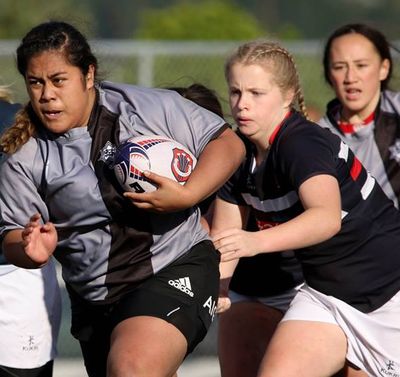 St Mary's College rugby. St Mary's College rugby. Girls: St Mary’s College are ‘re-building’ this year, and on the evidence of their form so far they’re doing a good job at it. The girls Top 4 Hine Pounamu Trophy is the first thing a visitor sees when entering the school’s reception, and they won’t be keen on relinquishing it just yet. They are unbeaten in Wellington and late last term swept away Feilding High School in a friendly match. Key fit and firing players over the next several weeks leading up to the 25 August Hurricanes schoolgirls final include outside back Dhys Faleafaga and fullback Julie Tusa (both playing club rugby for top Wellington side Norths) and props Laina Semu and Nive Leota. Basketball Boys: Mount Albert Grammar School - MAGS were third at the National Secondary Schools championships last year and before the school holidays became the first team in 2018 to beat defending National champions Rosmini College. Mt Albert had only scored 42 points at the three-quarter mark (leading 42-39) but exploded for 34 points in the final period to beat Rosmini 76-63. Ryan Laumatia, having been kept quiet by Rosmini up until that point scored 13 of his 17 points in the fourth. Aided by a couple of threes from Sataan Tawera and 8 points from Nate Wilson MAGS closed out the game for a seventh straight win. MAGS have beaten every team in the Auckland competition and boast the best defensive and second best offensive record. The MAGS girls are second in the Auckland competition as well with an 8-2 records suggesting that North Shore schools might not have it all their own way. Auckland Girls Grammar School head Auckland Premier Girls basketball with an 11-0 record. Girls: St Peter’s Cambridge - It’s hard to ignore the juggernaut that is St Peter’s. The National runners-up in 2017 were champions in 2015 and 2016. St Peter’s are unbeaten this year and in Ella Bradley and Charlisse Leger-Walker feature the two best age group players in the country. Both girls are with the New Zealand Under-17 team at the World Championships at present and both featured in Waikato’s National Under-19 tournament success, top scoring in the final. Leger-Walker won a bronze medal with the Tall Ferns at the Commonwealth Games in April, top scoring in the playoff. 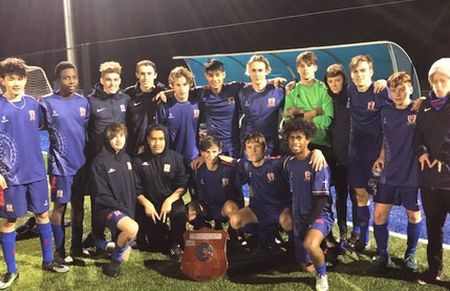 St Thomas' Football First XI. St Thomas' Football First XI. Football Boys: St Thomas Canterbury of Canterbury College - St Thomas were second in the Canterbury Youth league last season, but went onto surprise at Nationals finishing fourth and only losing two players this season. St Thomas have made a great start to the Youth League winning all eight games and outscoring opponents 36-5. Highlights of the season include winning the Brentwood Trophy against Shirley Boys’ High School and the Connetics Shield against Burnside High School. The Connetics Shield is like the Ranfurly Shield of school football in Christchurch. The team is superbly led by New Zealand Schools skipper Tom Stewart. National champions Hamilton Boys’ High School recently won the Super 8 while St Kentigern College and Sacred Heart College occupy the top two places in Auckland and were National semi-finalists last year. Girls: Saint Kentigern College - The defending Auckland champions head the Premier League with just one defeat in 11 games. St Kent’s have outscored opponents 40-12 and are three points clear of second-placed Epsom Girls Grammar who did beat St Kent’s 3-1 on June 24, but have scored 10 fewer goals. St Kent’s are the reigning National Champions and in Hannah Blake boast a striker who is good enough to start for the New Zealand Under-20’s, providing a potentially cutting edge difference to their roster. 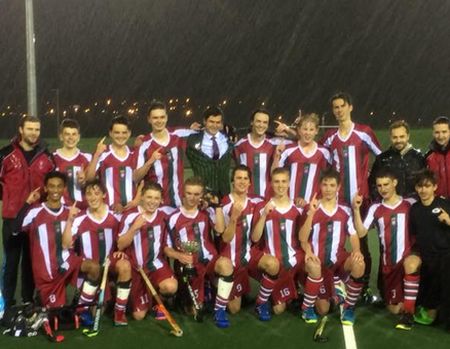 Westlake Boys' High School First XI hockey. Westlake Boys' High School First XI hockey. Hockey Boys: Westlake Boys’ High School - Westlake won the Rankin Cup as recently as 2015 and have scored 25 unanswered goals in four Super City games. St Kent’s are chasing hard having blanked four teams and scored 13 times. Daniel Woud has been an especially effective player. Saint Kentigern College and Westlake BHS were the only unbeaten teams at the ANZAC tourney with St Kent’s piling on 17 goals and only conceding twice in five games. Hamilton BHS held the Auckland powerhouse to a draw and Westlake shared two of their fixtures at that event. The Super 8 tournament is held in New Plymouth in a fortnight's time and will provide a strong gauge of where many of the typically strong teams nationally are at. Palmerston North Boys’ High School are the top seeds and defending champions. Girls: St Cuthbert’s College - St Cuthbert's College have scored 25 goals in winning all four of their Super City games thus far. Their wins have been 9-0 over St Mary’s College, 3-0 over Auckland Dio, 6-4 over Westlake Girls’ High School, and 7-0 over Baradene College. The Super City competition resumes this Thursday night with round 5 of 7. The defending national champions are poised to take a clear lead the top the table (current joint leaders Dio having played an extra game) with victory over Kristin School this week. As always, the Connetics Canterbury Girls Championship is hotly contested this year. There are three rounds to play in the round-robin, resuming this week. After seven rounds Rangi Ruru Girls’ School are leading on 19 points with St Margaret’s second on 17 and Villa Maria on 12. Rangi Ruru and St Margaret’s play this coming Friday in a feature clash. Netball
Epsom Girls’ Grammar School - The Auckland Secondary School Premier competition still has five rounds of 11 to play, resuming this week. At the school holiday break, Epsom Girls’ Grammar School were unbeaten with six wins. EGGS have so far beaten Macleans College 46-21, Aorere College 61-20, Howick College 41-28, McAuley High School 44-32, Baradene College 34-28 and Botany Downs 56-28. But hot on EGGS’ heels are perennial contenders Mount Albert Grammar School and Saint Kentigern College, both just back in second and third. MAGS are also unbeaten, but were held to a 37-37 draw by One Tree Hill College. MAGS beat St Kent’s 45-38 in their last match before the holidays, which is the latter’s only loss. Westlake Girls’ High School are in fourth with four wins, while last year’s national champions Howick College are in eighth of 12 teams with two wins, two losses and a draw – but have a catch-up game to play. A feature match upon the resumption of the competition sees EGGS take on MAGS. EGGS meets St Kent’s in the final round on 18 August. In Wellington, the Regional competition’s third round set of matches of seven is tonight (Monday). St Mary’s College, Sacred Heart College and St Oran’s College are the three schools that won their first two matches pre-school holidays. In Canterbury, the Super Net competition gets underway this Wednesday, with the first of three round-robin matches split in two pools. 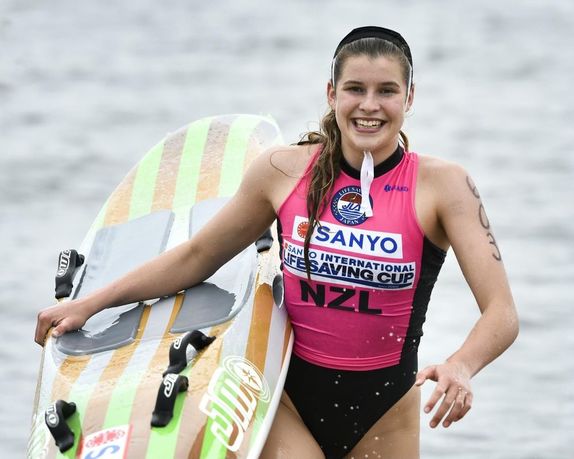 Claudia Kelly at the recent Sanyo Cup in Japan. PHOTO: Lester Kelly. Claudia Kelly at the recent Sanyo Cup in Japan. PHOTO: Lester Kelly. It’s an action-packed year for the Junior Black Fins team as they prepare to take on the world at the 2018 Lifesaving World Championships in Adelaide in November. Year 12 New Plymouth Girls’ High School athlete Claudia Kelly and the team's co-captain wouldn’t have it any other way in a sport she loves. “It’s really exciting to be training hard at the moment to represent New Zealand, for a young sportsperson it is the highest level to reach so it feels amazing to be able to do this,” said Claudia who represents the East End Surf Life Saving Club. “This week I am at a swimming training camp near New Plymouth so it’s a big workload at the moment, we have two two-hour training sessions each day plus a gym or dry land session as well.” Claudia is the second youngest person in the 12-strong Junior Black Fins team that features a dedicated group of current and recent school-aged surf lifesavers from around the country. The youngest is Briana Irving from Gisborne Girls’ High School. The Lifesaving World Championships consists of 43 pool and beach lifesaving events over five days of competition, including three days of pool events and two days of beach and ocean events. Claudia is an all-rounder. “I am a craft person, so I do board and ski but my main event is the ironwoman, and I also do some pool events as well. The ironwoman or oceanwoman is like a surf rescue medley event. “It is sort of like a triathlon of the water, it involves a surf swim and then a board leg, and a surf ski leg with a run transition in between. It’s a full-on 15 minute race.” Claudia has recently returned from Japan with the New Zealand Surf Life Saving High Performance team that finished second behind Australia at the annual Sanyo Cup competition. “We did really well as a young team and we were quite close behind Australia. They won by 20 points on day one but on day two we pulled together and they finished only eight points in front of us.” Other countries competing at the Sanyo Cup included USA, Great Britain, Netherlands, South Africa, Hong Kong and Japan. Claudia said the World Championships will be a step up in intensity and with more countries competing, but this and other recent high level competition means they know what to expect. 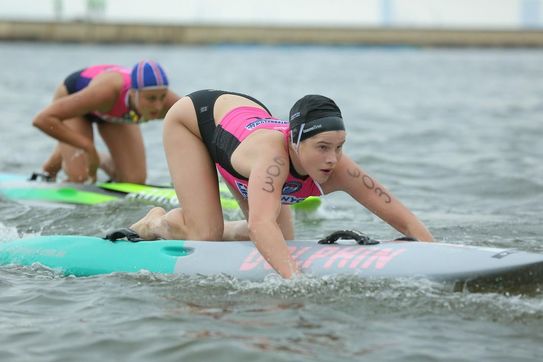 In action in the water at the recent Sanyo Cup. PHOTO: Japan Lifesaving Association. In action in the water at the recent Sanyo Cup. PHOTO: Japan Lifesaving Association. This was Claudia’s second time competing at the Sanyo Cup, and she has other international experience, being part of the team for the DHL International Surf Rescue (ISRC) challenge at Mt Maunganui late last year. She was part of the New Zealand Youth (U19) team that finished second overall in the three-Test series behind Australia, with Great Britain, South Africa and the USA filling the minor places. New Zealand won the second Test, with Claudia winning the Mixed Board Relay and Female Tube Rescue and Beach Relay team events. Earlier in 2017 she took home a Taranaki record of nine medals from SLSNZ Nationals. How long has she been doing surf lifesaving for? “I have been doing surf lifesaving for as long as I remember. I started because we live near the sea in New Plymouth and our whole family has always loved the beach and I think my parents wanted me to be safe at the beach so I got into it that way.” Working as a surf lifeguard is a pre requisite for competing, and the associated competitive events all replicate what can be required in the serious side of patrolling the beaches and potentially saving lives. “When we turn 14 in order to be able to compete at senior level surf events we have to complete our lifeguard award and be actively patrolling lifeguards. So we all do that over summer. We are all people that love to be at the beach anyway and we are helping out the community as well.” Claudia also has a background in other sports. “I was a competitive dancer for 10 years, then when I was younger I was involved in lots of sports. The last few years I have been focusing on cross country, swimming and at the moment surf lifesaving.” Both her older brother Chris and sister Isabella have represented New Zealand in secondary school cross country. Both were good surf athletes as well. Claudia is also accomplished academically, doing some level 3 NCEA subjects as well as level 2. “I love French, chemistry and maths and chemistry.” 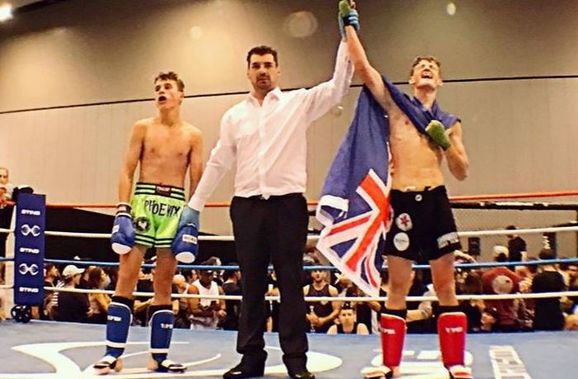 “I was in and out of hospital for six months before they sent me to Starship. They had no idea what to do so I was wired up in some crazy room and forced to take a purple inhaler instead of the traditional brown and blue inhaler,” Oliver Schmid rues when discussing his former battles with asthma. Out of breath playing football, Schmid found solace in Taekwondo. In four years he received a black belt in Kumgang Academy from Master Detlef. At the age of 14, over the worst of his asthma, Schmid entered a kick boxing ring for the first time. Why did the Westlake Boys’ High School student embrace such a violent sport? “Full contact is a real adrenaline rush. I enjoy the discipline of the gym and the strategy involved in out muscling someone. Fighting is not just about beating someone up,” Schmid responds. Battling a knee infection, Schmid managed to win his debut fight with only two months of training behind him. He has since fought 20 times under the tutelage of South African international Jason Vorster, a specialist in Shuriken MMA. “Jason has been massive for me. He helps me train six times a week and brings so much experience, support and encouragement,” Schmid marvels. In 2016, Schmid was the Oceana and intercontinental Junior K1 championship, defending the former title in Australia last year. “It was pretty cool to go to Australia and fight tough guys my age. I had two fights which were 3x2 minute rounds and beat two Aussies by decision,” Schmid recalls. Finding competitive opposition in New Zealand is a consistent challenge and the 70kg Schmid often fights well above his weight. “I've fought guys in their mid-20’s. I enjoy the challenge, but sometimes it's scary when you get an experienced dude with lots of tattoos and missing teeth,” Schmid laughs. 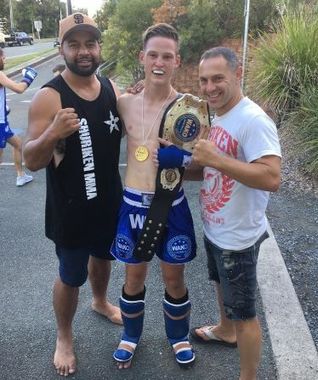 Schmid, 16, is unbeaten in his age group in Australian K1 kickboxing . Seeking greater challenges he is attempting to fundraise $5000 to compete in the Junior World Championships in Italy. This is Schmid’s last chance to test himself against other fighters in his age group from all over the world in the Junior K1 category. “The draw for Italy is determined on the first day of the tournament. It would be huge for me to compete. I put in a lot of work and want to make a career of it. This is a big step,” Schmid reveals. The Junior World Championships are in Venice from 15-23 September. New Zealand has a proud history in kickboxing with Mark Hunt having won the K1 world title and Ray Sefo being a household name in Japan. Schmid was born in the US and spent several years in Hungary before migrating to Auckland. His parents run the Manuka Corner honey business in Auckland. |
CategoriesArchives
March 2022
|
OrganisationCollege Sport Media is dedicated to telling the story of successful young sportspeople in New Zealand
|


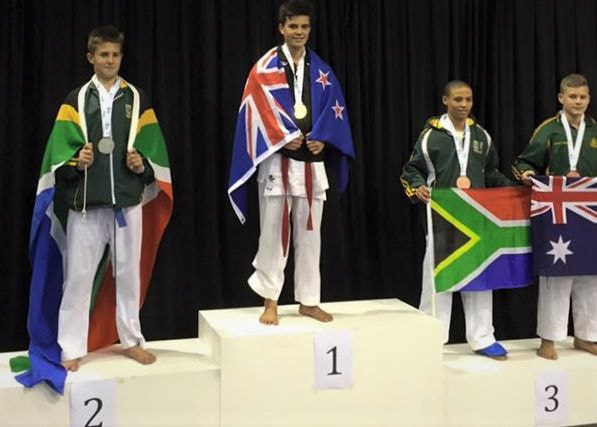
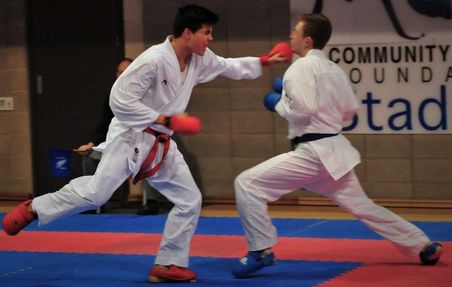

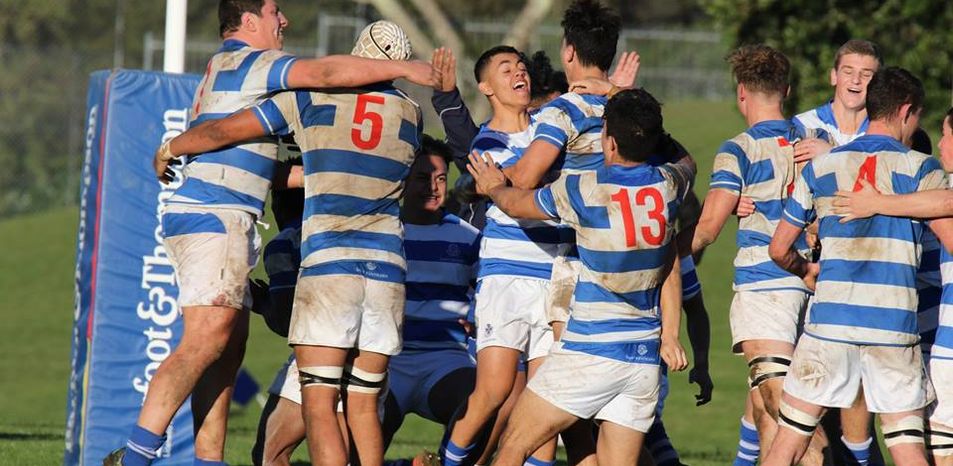



 RSS Feed
RSS Feed